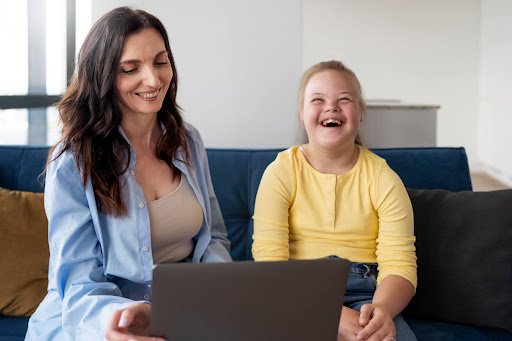Developing Adaptive Behavior in Individuals with IDD
At ECCM, our mission is to empower individuals with intellectual or developmental disabilities (IDD) by fostering environments that support growth and independence.
Developing adaptive behavior is key to enhancing the quality of life for those we serve. These behaviors — which include essential skills like communication, social interaction, and self-care — are vital for navigating everyday challenges and achieving personal goals.
By focusing on adaptive behavior development, the team here at ECCM helps individuals with IDD lead more independent, fulfilling lives.
What is Adaptive Behavior? Key Terms to Know
Adaptive Behavior refers to the collection of conceptual, social, and practical skills that individuals learn and perform in their everyday lives. These skills are foundational for personal independence and social responsibility. They encompass a wide range of activities, from understanding and following social norms to managing personal finances and maintaining personal hygiene.
Adaptive Skills (or Adaptive Living Skills) are the specific abilities that fall under the umbrella of adaptive behavior. These include crucial skills such as communication, which involves effectively expressing and understanding information; self-care, which covers daily activities like dressing and eating; and social skills, which enable individuals to interact positively with others. Each adaptive skill plays a role in helping individuals navigate their world more effectively.
Adaptive Function is the application of adaptive skills in real-life situations. It reflects how well an individual can meet the demands of their environment, whether at home, in the community, or at work. Adaptive functions measure how these skills translate into practical, everyday use, highlighting an individual's ability to adapt to new challenges and changes in their surroundings.
The Importance of Adaptive Behavior
Adaptive behavior is the cornerstone of personal independence and social integration for individuals with IDD. These behaviors are what enable them to navigate the complexities of daily life, fostering a sense of autonomy.
Personal Independence and Social Integration
Adaptive behaviors encompass a range of skills that are essential for living independently and participating fully in society. By mastering these skills, individuals with IDD can perform daily tasks such as managing personal care, handling finances, and making informed decisions. This independence not only boosts self-esteem but also empowers individuals to take control of their lives.
Moreover, adaptive behaviors facilitate social integration by equipping individuals with the tools needed to communicate effectively, build relationships, and engage in community activities.
Educational and Vocational Settings
In educational settings, adaptive behaviors are crucial for academic success and social development. They help students with IDD navigate the school environment, interact with peers and teachers, and participate in classroom activities. Educators can tailor their teaching strategies to support the development of these skills, ensuring that students are equipped to meet both academic and social challenges.
In vocational contexts, adaptive behaviors are equally important! They enable individuals to perform job-related tasks, adhere to workplace norms, and interact with colleagues or supervisors. By developing these skills, individuals with IDD will pursue meaningful employment, contributing to their financial independence.
Strategies for Cultivating Adaptive Behavior
Cultivating adaptive behavior requires a comprehensive, personalized approach. By focusing on individual strengths and needs, we develop effective strategies that build independence and social integration.
Individualized Assessment and Planning
The first step in cultivating adaptive behaviors is conducting comprehensive assessments to identify each individual's strengths and areas for improvement. These assessments provide valuable insights that inform the development of an Individual Service Plan (ISP), focusing on specific adaptive skills. By tailoring strategies to individual needs, we ensure that each person receives the support necessary to thrive.
Skill Development Programs
Skill development programs focus on areas such as communication, self-care, or social interaction, and use evidence-based practices and interventions. Customized programs make a big difference, as they facilitate meaningful progress and skill acquisition.
Family and Caregiver Involvement
Caregivers are to be involved in the adaptive behavior development process; in fact, it is essential for consistency and overall support. When they are included in the planning, we can create a cohesive network that reinforces adaptive skills at home.
Providing training and resources also empowers caregivers to effectively support skill development, boosting the impact of any given strategy.
Community Integration and Social Opportunities
Community-based activities are a powerful way to encourage social interaction as well as practical skill application. By promoting inclusive environments, individuals with IDD can practice (and refine) their adaptive functions in real-world settings. Beyond enhancing skill development, such opportunities foster a sense of community engagement.
Technology and Assistive Devices
Leveraging modern technology will significantly support skill development and independence. From communication aids to mobility devices, technology offers innovative solutions that enhance daily living tasks. With these tools, we empower individuals to overcome challenges and achieve greater autonomy.
Measuring Adaptive Behavior Progress
To be certain that every individual receives the most beneficial support, ECCM’s care team regularly evaluates the effectiveness of interventions.
Evaluation and Adaptation
Community assessments allow us to track progress and identify areas that may require adjustment. This ongoing evaluation is essential for understanding how well the strategies are working and whether they are meeting the individual's goals.
When gathering data and feedback, we can make informed decisions about necessary changes to the personalized plans so that they remain relevant and effective.
Celebrating Milestones
Recognizing achievements is a powerful motivator for continued growth and development. Whether it's mastering a new skill, achieving a personal goal, or making progress in social interactions, acknowledging these successes boosts confidence and encourages further effort.
Celebrations take many forms, from verbal praise and certificates to small rewards or special activities.
Advance Adaptive Behavior with ECCM
Are you ready to unlock new possibilities in developing adaptive behavior? At ECCM, it’s our mission to empower individuals with intellectual or developmental disabilities to achieve their fullest potential.
Our tailored programs and resources are designed to support personal growth and independence, no matter where you are on your journey. Reach out to our care team today to get started!

